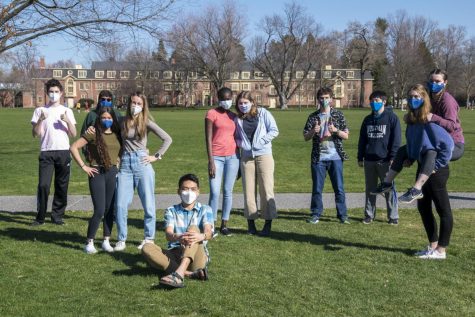Global Studies Initiative Revamped
December 5, 2017
After the completion of a yearlong external review, the Global Studies Steering Committee is ready to submit a series of proposals outlining the revamped Global Studies Initiative.
GSI Director and Politics Professor Aaron Bobrow-Strain uses the tagline “Whitman to the World” to describe the program. His vision for the Center for Global Studies is two-fold: a place to help students and faculty access all of the globally-oriented courses already offered at Whitman College, and a hub for creating a new, innovative global curriculum.
According to Bobrow-Strain, insufficient student awareness was a crucial problem that the external review uncovered.
“We were doing a lot of great work, but we weren’t telling the story well,” said Bobrow-Strain.
Bobrow-Strain spent summer of 2017 talking with the president, faculty leaders, students, key staff members and the admissions office about the ways the new vision for the global studies program could help them with the issues they’re concerned about.
Vice President for Diversity and Inclusion Kazi Joshua believes the steering committee should be commended for how it responded to the external review, and how they addressed the most important issues.
“I think we should allow the new version of GSI to unfold without any hindrance and support it in every way possible,” Joshua said. “Then after a certain period, the steering committee can assess where they are.”
Instead of creating a new interdisciplinary major, which would require staffing and an introductory Global Studies course, the committee is proposing a Concentration in Global Studies.
“We weren’t interested in [a major]. What we were interested in was a much more agile, new way to think about curriculum,” Bobrow-Strain said.
With the concentration, students in credit-intensive majors could still demonstrate and be recognized for having thought about the global in a meaningful way.
Bobrow-Strain stressed that employers care most about the knowledge, connections and experiences a student has, and not necessarily their degree.
“I was just in New York and I met with a former student who runs a biotechnology startup in Brooklyn,” Bobrow-Strain said. “He said about 70 percent of his work involves traveling to China and navigating Chinese business. He really wished he had had a more of a global focus and a structure for thinking about the global economy while he was here.”
The committee envisions a competitive process of recruiting a cohort of 14-16 students who have demonstrated interest in engaging with global questions. In the fall of their Sophomore year, the students would participate in a seminar focused on a topic of global importance. There would also be a faculty cohort engaging with the same topic separately. The two groups would then come together for plenary sessions, and in the spring semester, develop a capstone. Participating faculty members would receive a large increment in their professional development fund and students would gain the prestigious Sophomore Global Studies Fellows title.
“Imagine doing this for years, and after many years you’ve got alums who were sophomore fellows out in the world,” Bobrow-Strain said. “They’re working in biotechnology startups, the United Nations … there is a whole cohort of students out there who have this global sense and are committed to helping current students.”
The committee also proposed a post-abroad, 1 to 2 credit synthesis course. The class would serve as a bridge between a student’s off campus experience, what they’re doing at Whitman, and what they want to do with the rest of their career.
The O’Donnell visiting educators, already a staple at Whitman College, would be incorporated into the program as well. Visitors would be people with distinguished careers outside of academia, such as journalists, scientists and public servants, working on global issues. While visitors would still do a talk, that part is de-emphasized under the GSI. Instead, the committee has focused on high-impact, student learning pieces such as intensive workshop classes.
“For example, next semester we’re having a person teach a class on Social Volcanology,” said Bobrow-Strain. “He’s a volcanologist who works in communities in the Global South and focuses on community-based hazards assessment and mitigation of volcano threats.”
The committee is also designing a program where an O’Donnell visitor could offer a summer internship to a student they worked with in the workshop. The program would be on a small trial basis and would serve as a way to continue and lengthen the interaction.
A 10 year budget is being created in collaboration with Provost Tipton for all of the global studies programs. The committee does not need to raise any new money; it draws on endowments that already exist.
The committee hopes the revamped GSI program will restart in Fall of 2018.
“GSI is consistent with the college’s mission to prepare students who will understand the changing world that is global,” said Joshua. “It is innovative, it is interdisciplinary, it explores in sophisticated ways issues of difference, power and social justice. It is in short what we hope a liberal arts education might look like.”
Editor’s Note: A previous version of this article stated that “Provost Tipton created a 10 year budget for all of the global studies programs.” The budget is being created in collaboration with Provost Tipton. The previous version also inaccurately stated that only students participating in the Concentration program will be considered for the Sophomore Fellows Program. The two programs are entirely separate.





